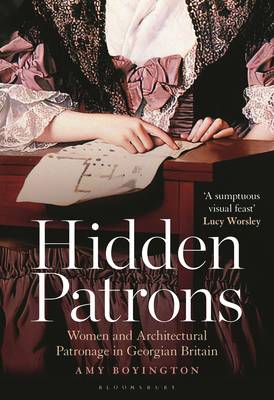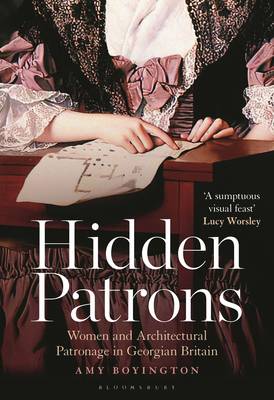
- Afhalen na 1 uur in een winkel met voorraad
- Gratis thuislevering in België vanaf € 30
- Ruim aanbod met 7 miljoen producten
- Afhalen na 1 uur in een winkel met voorraad
- Gratis thuislevering in België vanaf € 30
- Ruim aanbod met 7 miljoen producten
Zoeken
Hidden Patrons
Women and Architectural Patronage in Georgian Britain
Amy Boyington
Hardcover | Engels
€ 103,45
+ 206 punten
Uitvoering
Omschrijving
An enduring myth of Georgian architecture is that it was purely the pursuit of male architects and their wealthy male patrons. History states that it was men who owned grand estates and houses, who commissioned famous architects, and who embarked upon elaborate architectural schemes.
Hidden Patrons dismantles this myth - revealing instead that women were at the heart of the architectural patronage of the day, exerting far more influence and agency than has previously been recognised. Architectural drawing and design, discourse, and patronage were interests shared by many women in the eighteenth century. Far from being the preserve of elite men, architecture was a passion shared by both sexes, intellectually and practically, as long as they possessed sufficient wealth and autonomy. In an accessible, readable account, Hidden Patrons uncovers the role of women as important patrons and designers of architecture and interiors in eighteenth-century Britain and Ireland. Exploring country houses, Georgian townhouses, villas, estates, and gardens, it analyses female patronage from across the architectural spectrum, and examines the work of a range of pioneering women from grand duchesses to businesswomen to lowly courtesans. Re-examining well-known Georgian masterpieces alongside lesser-known architectural gems, Hidden Patrons unearths unseen archival material to provide a fascinating new view of the role of women in the architecture of the Georgian era.Specificaties
Betrokkenen
- Auteur(s):
- Uitgeverij:
Inhoud
- Aantal bladzijden:
- 328
- Taal:
- Engels
Eigenschappen
- Productcode (EAN):
- 9781350358614
- Verschijningsdatum:
- 30/11/2023
- Uitvoering:
- Hardcover
- Formaat:
- Genaaid
- Afmetingen:
- 164 mm x 240 mm
- Gewicht:
- 938 g

Alleen bij Standaard Boekhandel
+ 206 punten op je klantenkaart van Standaard Boekhandel
Beoordelingen
We publiceren alleen reviews die voldoen aan de voorwaarden voor reviews. Bekijk onze voorwaarden voor reviews.











